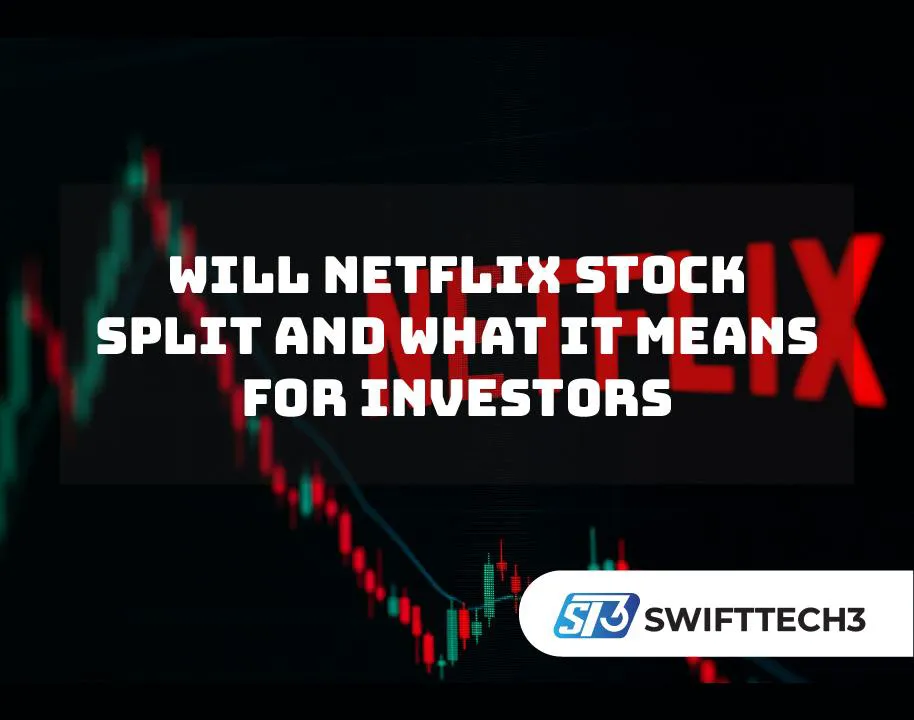When people ask will Netflix stock split, it’s not just a random thought, it’s something that really matters for investors, traders, and even people curious about the way big companies handle their shares. A stock split can change the way a stock looks in the market, make it more affordable for retail investors, and often stirs hype even though the company’s fundamentals stay the same. Netflix, one of the biggest streaming services in the world, already has a history of splits, and so it makes sense people keep asking if another one is on the way.
But here’s the thing: a split is not magic. It doesn’t change Netflix revenue, growth or earnings. What it really does is change the price per share and the number of shares you own. Let’s go deeper and try to answer the question — will Netflix stock split again, and what should smarter investors pay attention to.
What is a Stock Split Anyway?
A stock split is basically when a company decides to cut its shares into smaller units, so the stock price goes down but total value stay the same. Imagine you got a pizza and you cut it into 8 slices instead of 4 — you don’t have more pizza, just smaller slices. That’s how stock splits work.
Companies do this for few reasons:
- To make the share price look more affordable for everyday people.
- To increase liquidity and trading volume.
- Sometimes just to send a signal to the market, like saying “we are confident in our growth.”
It’s important to remember, splits don’t change the core financial data, guidance, or foundation of the business. It’s more of a cosmetic adjustment in the trading world.
Netflix Split History
Netflix has already split before, and that’s why people expect it might again.
- In 2004, there was a 2-for-1 split.
- In 2015, Netflix announced a 7-for-1 split, which was huge and made the shares much cheaper at the time.
Since then, the company has grown massively. The stock has gone from being under $100 after that 2015 split to crossing over a thousand dollars per share in recent years. If you check the official Netflix Investor Relations site you can see the full history, data, and filings. That’s why analysts, market watchers, and even podcasts from Motley Fool keep bringing up this question again and again.
Why People Think Netflix Might Split
There are few main reasons why analysts and people in the investing world think another split could happen:
- High stock price: Netflix shares are trading at levels that look high compared to other companies. A split could make the stock look more approachable to small investors.
- Trading solutions: When stocks are too expensive, it makes options contracts and trading strategies harder to use. Splits can make trading smoother.
- Peer companies: Big names like Apple and Tesla did splits in the past few years, and they got a lot of positive market buzz from it. Some analysts think Netflix could follow the same path.
- Investor demand: People love lower looking share prices, even though the value is the same. A split could help bring in millions more retail investors across the world.
Why Netflix Might Not Split
On the other hand, Netflix management might decide against it. Reasons include:
- Fractional shares: Many brokers let you buy fractions of a share now, so the high price is less of a problem.
- Focus on fundamentals: Netflix leadership talks more about growth, services, guidance, and earnings than cosmetics.
- No official announcement: So far, there’s no link or data showing that a split is planned this year or even next.
This shows that while splits are popular in media analysis, the actual decision is more complex.
Real Market Example: Netflix and Split Speculation
Back in 2015, the split did boost sentiment. Shares were easier to buy, and more people jumped in. But not every split leads to instant gains. According to fool.com, stocks often see short-term hype after splits but long-term performance still depends on earnings, revenue growth, and strong services.
That’s why seasoned investors don’t just trade on split rumors. They look at guidance, listen to earnings calls, check analyst reports, and review data across years. Splits might give stocks a bump, but smarter investing always comes down to fundamentals.
Pros and Cons of a Potential Netflix Split
Pros
- Lower share price makes it look more accessible
- Could attract more retail investors
- More liquidity and easier trading strategies
- May boost sentiment in the short term
Cons
- No change in fundamentals like revenue or earnings
- Risk of people buying only for hype
- If growth slows, the lower price per share won’t help
- Netflix might see it as distraction from core business
What Investors Should Watch
If you’re waiting to see will Netflix stock split, here are some practical signals:
- Company filings: If Netflix board authorizes more shares, that’s a clue.
- Earnings guidance: Splits often follow strong results, not weak ones.
- Analyst chatter: When multiple companies or analysts begin calling for it, momentum builds.
- Share price levels: If it keeps climbing past levels where trading becomes less smooth, splits become more likely.

FAQs
No. Stocks don’t gain value automatically from splits. Price adjusts, but total investment value stays same.
Two splits: 2004 (2-for-1) and 2015 (7-for-1).
Possible, but no confirmation. Analysts only speculate, and the company has given no guidance.
Not really. If you’re holding for 5-10 years, what matters more is revenue, earnings growth, services expansion, and competitive edge.
Conclusion
So, will Netflix stock split again? The honest answer — maybe, but nothing official. History shows Netflix isn’t afraid to split when its share price climbs too high, but with fractional investing and modern finance solutions, it’s not as necessary as it once was. Investors should focus more on the company’s services, revenue growth, and data rather than only chasing split rumors.
Splits can be fun, they make stocks feel cheaper, and they create buzz across the market. But smarter investing is about looking past cosmetic moves and staying focused on fundamentals. In the end, whether Netflix splits next month or in a few years, your success comes from buying strong companies and holding them through time. And just to be clear, this isn’t financial advice — stock prices, earnings, and analyst guidance can always change, so any investment decisions should be made carefully.


